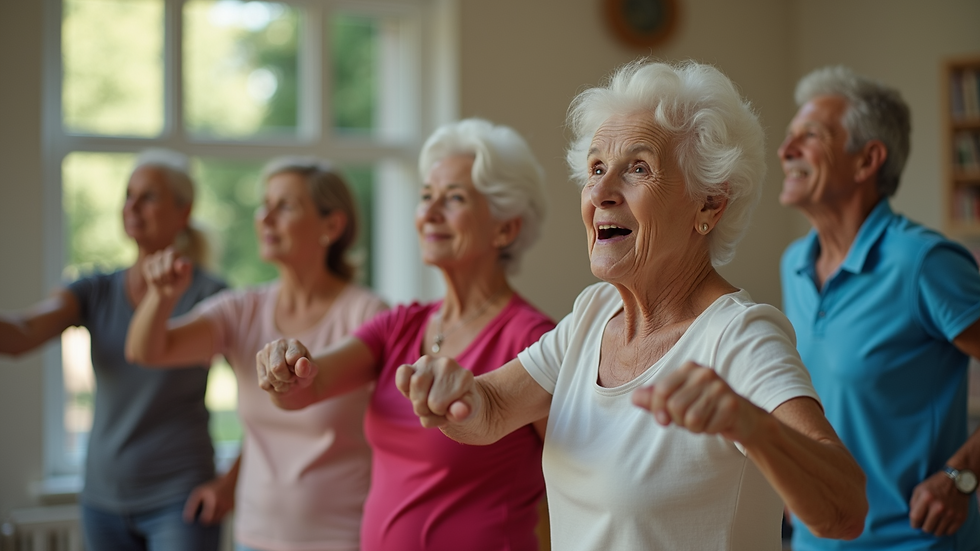The Connection Between Mental and Physical Health in Seniors: Exploring the Unseen Link
- Gifted Gabber

- Mar 19, 2025
- 4 min read
As we grow older, the relationship between our mental and physical health becomes more impactful. For seniors, finding a stable balance that emphasizes both wellness aspects can be challenging but necessary. This blog examines the deep connection between mental and physical health in seniors, highlighting how each influences the other.
Understanding Mental Health in Seniors
Mental health involves our emotional, psychological, and social well-being. It significantly shapes how we think, feel, and act, affecting our decisions and interactions with others. Seniors can face mental health challenges due to various factors like loneliness, chronic illness, and cognitive decline.
For example, studies show that about 20% of seniors experience mental health disorders such as depression and anxiety. These conditions can significantly diminish quality of life. Prioritizing mental well-being is essential, as a healthy mindset contributes to physical health, leading to a more fulfilling life.
The Significance of Physical Health
Physical health refers to how well our bodies function, including the absence of illness and the ability to stay active. Regular exercise, a balanced diet, and routine health check-ups are critical to maintaining good physical health.
For seniors, staying physically healthy can lead to a better quality of life. Engaging in even moderate exercise can lead to a 30% reduction in the risk of chronic diseases like diabetes and heart disease. Physical activity improves mobility, boosts cardiovascular health, and contributes positively to mental health. This connection creates a cycle where improved physical health enhances mental well-being.
The Interconnectedness of Mental and Physical Health
Research consistently shows a strong link between mental and physical health. Poor physical health can lead to mental health issues, and vice versa. For instance, a senior suffering from chronic pain may develop anxiety or depression. Conversely, depression can lead to neglecting physical health, creating a negative feedback loop.
Engaging in physical activities can lift mood by releasing endorphins, which are natural mood enhancers. For example, a study found that seniors who exercised regularly reported a 25% improvement in their mood and overall mental health.
The Impact of Social Connections
Social interaction is vital for both mental and physical health. Seniors often experience social isolation due to factors like retirement, the loss of loved ones, or mobility issues. This isolation can lead to loneliness and depression, impacting overall health.
Regular interaction with friends, family, or community groups can provide emotional support and boost self-esteem. Programs that promote social engagement, such as group fitness classes or book clubs, can significantly enhance mental and physical health. Research shows that participating in social activities can reduce the risk of cognitive decline by 50% among older adults.
Nutrition: A Key Player in Overall Health
Nutrition plays a crucial role in connecting mental and physical health. A balanced diet provides essential nutrients that impact brain function and emotional health. Foods rich in omega-3 fatty acids, like salmon and walnuts, and antioxidants found in berries, support cognitive function.
Seniors should aim for a varied diet that includes whole grains, lean proteins, fruits, and vegetables. For instance, research indicates that seniors who consume a diet high in fruits and vegetables can enhance their cognitive abilities by 20% compared to those with lower intake. Eating well not only supports physical health but also improves mood and mental clarity.
Coping Strategies for Seniors
To strengthen the relationship between mental and physical health, seniors can adopt effective coping strategies. Mindfulness practices such as yoga or meditation can help reduce stress and improve emotional resilience. Regular physical activity tailored to individual abilities is also vital. Simple exercises like walking or stretching can lead to noticeable improvements in both physical fitness and mental wellness.
Furthermore, seniors should not hesitate to seek professional help when needed. Therapists can offer support for mental health issues, while healthcare providers can assist in managing physical health concerns, ensuring a holistic approach to well-being.
The Role of Healthcare Providers
Healthcare professionals play a key role in bridging mental and physical health. Regular mental health screenings should be part of seniors' routine healthcare. Recognizing the intertwined nature of physical and mental health can lead to comprehensive treatment strategies.
Encouraging open conversations between healthcare providers and their senior patients fosters understanding and better management of health needs. For example, healthcare providers can recommend group fitness programs that address both physical and mental health, reinforcing their patients' overall wellness.
A Balanced Approach to Aging
Understanding the connection between mental and physical health is essential for seniors. Focusing on both aspects can lead to a vibrant and fulfilling life. Promoting a lifestyle that includes physical activity, social interaction, and proper nutrition, along with mental health support, is key to successful aging.
In a world that often sidelines seniors, it is vital for them to appreciate this connection and actively participate in their health journey. Taking steps toward a balanced approach can empower seniors to live lively and healthy lives.





Comments